Millennials Are Far Less Tolerant Than You Probably Think
by Anthony Sibley (AJ) on Jan 18, 2015 | Views: 638 | Score: 1
| Racial Attitude (actual) | Racial Attitude (self-reported) | |
|---|---|---|
| 10 | 0.86 | 0.36 |
| 20 | 0.88 | 0.34 |
| 30 | 0.79 | 0.32 |
| 40 | 0.79 | 0.37 |
| 50 | 0.84 | 0.42 |
| 60+ | 0.98 | 0.6 |
Implicit and Explicit Racial Attitudes by Age Decade
"Actual" measured via Implicit Association Test
Sources:
nymag.com, faculty.washington.edu

 of
of

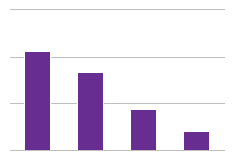
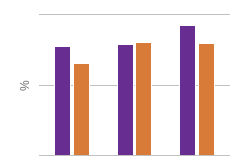
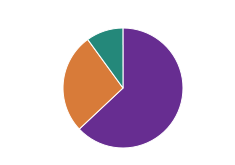
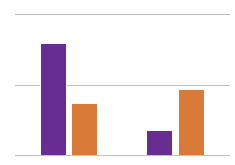
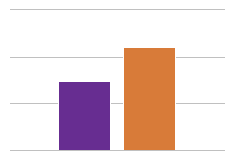
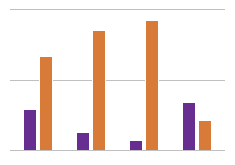
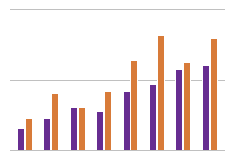
Racial progress is often hailed as inevitable with the maturation of the "millennial" generation-- typically considered the most tolerant towards all groups of historically stigmatized people. In actuality, however, there is statistically insignificant difference in the implicit racial biases expressed among all age groups, excluding those age 60 and above, who do show a higher level of racial animosity. Ironically, millennials are the most likely to misgauge their own racial bias, significantly underestimating their prejudices.
I agree, this chart reveals something very important: we (Americans) tend to misgauge our tolerance of racial differences. However, I would argue that the most important finding here is that society as a whole isn't getting terribly more progressive. There isn't a significant gap between ages 10 and 50 in actual reported racial attitude.
Hey Kendra, thanks for the comment. You're absolutely right; that is the point I mean to demonstrate. Racial progress is often misperceived as an inevitable development in modern society. Instead, the data reveals that there is no significant difference in the levels of prejudiced attitutes between younger and older age groups. This misperception of racial advancement is promoted by, among other things, the false notion of millennials as more tolerant than previous generations. In this line of reasoning, people imagine that society will effortlessly progress to a "post-racial" state, given time and subsequent generations.
I must admit that I was under the assumption that Millennials are the most tolerant age group we've ever had in the United States in terms of a wide variety of social issues. How might we cultivate tolerance among our youngest adults?
Both of you bring up a great point about perceived Millennial tolerance and how we should try to improve tolerance levels. I don't know if I can offer a solution, but I did think about what drives Millennials to have these racial attitudes. Perhaps pivotal events like the Columbine shooting, 9/11, and the ensuing war on terror makes young people more fearful of the "other" than older generations. Any solution should consider this ingrained fear.
Peter, that's a great question, and Kendra, that is a valid observation. However, I do not think that there is anything unique in the factors driving Millennials' racial attitudes, compared to any other generation. A key takeaway from this data, as Kendra previously reaffirmed, is that society is not getting more racially tolerant; so we need to stop pretending that we are. The taboo that we have placed on racial discussions-- in our homes, communities, and political discourses-- does little more than allow unfounded stereotypes to perpetuate-- even ones based on tragic events like the ones Kendra stated. It is not these events, in themselves alone, that have made millennials (or anyone else) more fearful of the "other." It is also our depiction of others, as the "other." Studies, including other sections of this one, reveal that people-- and the media-- are far more likely to portray the misdeeds of certain individuals, such as radical Islamists, as characteristic of the entire group, in this case Muslims. While other individuals, like ones that kill dozens in schools or movie theaters, are instead depicted as personally derranged, with their actions separate of any consideration of their race or other grouping. Our sensationalizing news media encourages this false generalization of the other. As does our anathema to any discussion on race, privilege, or discrimination. If a child knows nothing about a people save for how they are portrayed in the news, and is rarely ever encouraged to consider other groups' circumstances or differing perspectives on matters, it seems inevitable that the child would grow to form misguided generalizations about the entire group, such as their criminality, terrorism, drug abuse, or pedophilia. With the extreme residential and other de facto segregation that occurs in American society between races, there is little opportunity for widespread interpersonal relations to dispell these false associations. Only through actively endeavoring to bring to light the ways in which we accept and promote this prejudice, and working to amend these mechanisms, can we truly attain an America in which all are treated equal. Whatever we do, one thing is absolutely certain-- simply closing our eyes to such discrimination, and waiting for it to go away, has not, and will not, ever effect change (except to delude ourselves into thinking that things are better).
Thank you very much for your thoughtful response AJ. People often flinch at thinking or even hearing about racial or economic injustice, perhaps thinking that things simply can't be so. Sometimes, they are. Hindsight is 20-20. Of course slavery, child labor, and disenfranchising women were ethically bankrupt institutions or practices. It is clear for everyone to see that now (hopefully). Maybe 50 years down the line we can look back and recognize that economic inequality, disparity of opportunity, and the cycle of racial conflict they engender have created for us in the present a situation that can get quite toxic, as we witnessed in the aftermath of high-profile instances of police violence in particular.